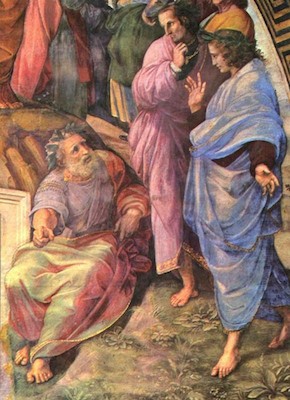
Detail from Raphael’s “Parnassus” showing Pindar and Horace, two of the classical poets Timothy researched on.
In the summer of 2013 I had the good fortune of participating in ISI Florence’s workshop “Translating the Past”. I could not have hoped for a more welcoming atmosphere than the one provided by the faculty and staff, whose hospitality and professionalism made the charm of the most remarkable of cities shine with the brightest urbanity. Throughout the course of the workshop I was constantly humbled by the graciousness of Stefano Baldassarri, to whom many thanks are due. His continuing generosity and endorsement have since resulted in my contribution as translator to Crystall Hall’s new edition of Galileo’s “Assayer” (forthcoming in The University of Chicago Press). I am also grateful for the chance to have met and studied with Professor Paul Gwynne; for his patience in painstakingly poring over Ficino with me in the Biblioteca Nazionale (national library in Florence); and, above all, for his dry humor, conversation, and company. He, too, has kept me in the loop by inviting me to contribute a chapter on Zacharias Kallierges’ 1515 Roman edition of Pindar to an international project on Agostino Chigi. I am also thankful to Professor Antonella Ghignoli for her warmth, and to Professor David Rundle for his expertise.
Currently, I am working toward completing my dissertation, “Alpheios and Arethousa: The Choral Networks of Archaic and Classical Greek Sicily and the Politics of Interstate Exchange”, under the supervision of Professor Dimitrios Yatromanolakis. This year I have published an article in Mnemosyne (vol. 68.5) on the proem of Pindar’s “Olympian 9” and have planned further submissions for Quaderni Urbinati and Classical Antiquity. With warmest regards to all the members of and contributors to ISI Florence, whose continued kindness is indicative of a genuine dedication to education, scholarship, and the spirit of the humanities.
Timothy Smith
The Johns Hopkins University
